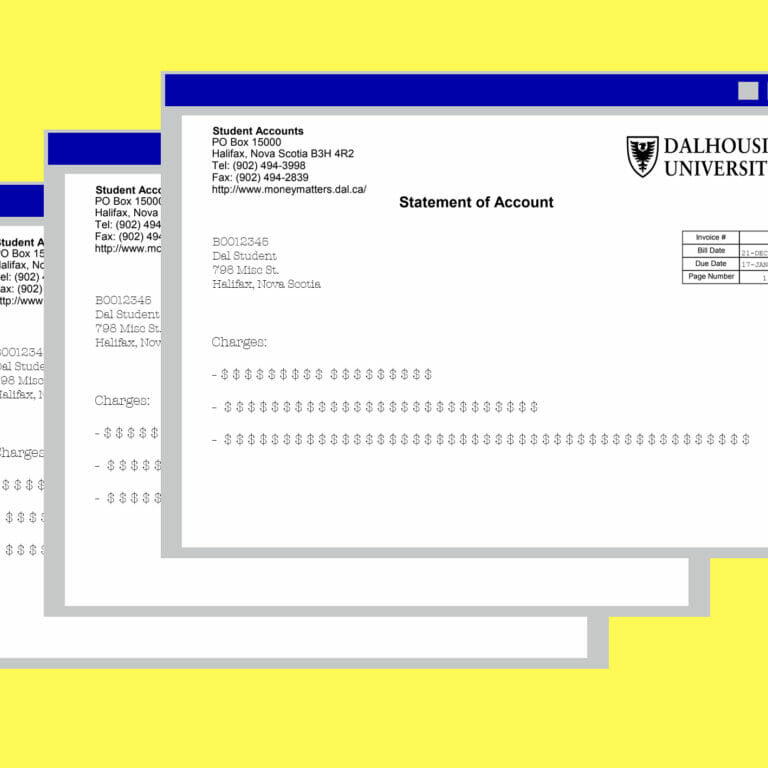
Tuition rises to keep pricing competitive
Budget committee says government funding is not enough for Dalhousie
Tuition for international students at Dalhousie University has risen over $4,500 in the past decade, $1,300 of which happened in 2019-20 alone.
Tuition increases for all students are a necessary response to insufficient funding from the provincial government, according to the Dalhousie Budget Advisory Committee Report on Dal’s 2020-21 operating budget.
However, the N.S. Canadian Federation of Students’ Chairperson Lianne Xiao said the province’s education department is arguing that high fees for international students are normal because programs must remain competitively priced.
“Education is a right, not a luxury,” said Xiao.
A provincial issue
Xiao notes that Dalhousie’s annual tuition increase doesn’t only affect Dal students, but all students in the province. “A lot of universities will start to match their tuition fees to upkeep the post-secondary sector.”
The post-secondary sector and the provincial government reached a new agreement in the fall of 2019 on what funding universities will be granted by the province over the next five years.
The memorandum of understanding (MOU), released Sept. 13, 2019, outlined a one per cent funding increase to universities to $365 million annually — a $3.6 million bump from 2018-19. The most recent MOU will go into effect on April 1 and continue through to 2024.
Government funding not enough
According to Dal’s Budget Advisory Committee Report, released Oct. 25, 2019, “the one per cent increase in grant support is not adequate to cover Dalhousie’s annual cost increases.”
From the report, government funding between 2014-15 and 2019-20, has decreased from 53 per cent to 49 per cent of the university’s total revenue. The revenue from tuition has grown from 35.5 per cent to 41.2 per cent.
The decrease in government funding has had an impact equivalent to $1,400 per student, according to the report. This is now being made up through tuition — predominantly from international students.
The number of international students enrolled at Dalhousie has nearly doubled from 2011 to 2018, rising up to just under 4000. In the meantime, since 2011, international student tuition has increased by 33 per cent.
Through the October memorandum, the province implemented three per cent tuition caps that only cover Nova Scotian undergraduate students. Those who are out of province, international, graduate and in the professional studies (medicine, law and dentistry) have no cap on tuition.
“Essentially, the boards can vote to raise tuition for domestic students to a maximum of three per cent and for the rest of students to whatever amount they want,” said Lianne Xiao.
This was the case with the MOU released in 2015, which expires at the beginning of April.
International tuition spikes
During the five-year period since the 2015 MOU was released, tuition for international students was raised at three per cent per year, until 2019-20. However, since international student tuition is greater than that of domestic students, a three per cent increase, in 2017-18 for example, meant $216 for domestic students and $486 for international students.
For the 2019-20 school year, Dalhousie raised international tuition by 8.1 per cent — a $1,371.84 increase.
In an October interview with the Dalhousie Gazette about the 2019 MOU, the minister of Labour and Advanced Education for the province, Labi Kousoulis, said lower tuition would not necessarily mean a more accessible education for those from low-income households.
“That means that whoever has the best marks goes to university because there’s limited seats. And it means parents, wealthy parents, pay for tutors so that their kids can excel, while lower income families cannot afford that luxury,” Kousoulis said.
While Dalhousie says their need to increase tuition is a consequence of a lack of government funding, their report says this is a common standard. “On average international students across Canada are expected to pay a greater portion of the full cost of their programs through their fees,” reads the October report by the Dalhousie Budget Advisory Committee.
During the Feb. 11, 2020 Board of Governors meeting, the university said a new report from the Budget Advisory Committee will be shared in the coming weeks. The board is preparing to discuss the budget and future tuition at their meeting in the spring.






